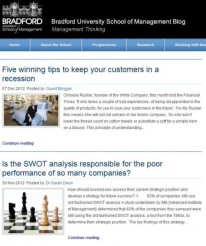Ten great blogging tips for #academics to promote their research
11 December 2012 By Northern Lights

There are a growing number of academics who understand the value of blogging. It can help with REF impact and as Dr Sarah-Louise Quinnell, social scientist and managing editor of the site PhD2Published, says ‘(blogs) complement and add value to traditional methods of career development and publication’.
 She adds: “Publishing traditionally takes a very long time, in some cases up to two years, so blogs allow for immediate engagement and debate of current issues. If they didn’t have value or something to offer then why would the LSE or the publishers SAGE have invested in blogging?”
She adds: “Publishing traditionally takes a very long time, in some cases up to two years, so blogs allow for immediate engagement and debate of current issues. If they didn’t have value or something to offer then why would the LSE or the publishers SAGE have invested in blogging?”
Dr Quinnell believes blogs have a great deal of value to the academy and they allow authors to comment and debate on current issues.
So what should an academic include in their blog to be successful?
1. Academics should be strategic about blogging
 Most blogging books talk about the need to find your blogging ‘voice’. If people are going to follow your blog, they want to know what it will be about and know it will be consistent.
Most blogging books talk about the need to find your blogging ‘voice’. If people are going to follow your blog, they want to know what it will be about and know it will be consistent.
But more important, perhaps, is the need for you to be clear about what you want to achieve. Writing blogs can be time-consuming, but if properly planned they should add value for that time.
Ask yourself what could a blog achieve for you? Help your students to understand complex subjects; get your students to continue the lecture theatre debate by leaving comments on your blog; engage with academics around the world; disseminate your research to wider audiences; position your expertise nationally and internationally; be spotted by journalists and become a media commentator.
All of these are possible with a blog. Which matter to you?
2. Quick tips for academic blogs
There are no hard and fast rules for how long a good academic blog should be. The most important element is that you have really good content that your readers want to open and read.
Google likes to see people coming on to a blog, sharing it (by Twitter, LinkedIn, Google+ and so on) and leaving comments, clicking some of the links and staying on the blog long enough to read it. The more your blog engages readers, the better ranked it will be.
The following are guidelines that will help you
- Ideally 600 to 800 words – probably no shorter than 400 words and if it is really good content then 1000+ words is fine
- About 10 hyperlinks per blog – 70% to external, quality sites (FT, BBC News, academic sites) and 30% to your university website or own blog
- Lots of pictures and video clips – makes it more readable
- Vulnerability or half the conversation – encourage readers to finish the conversation so they leave a comment
3. How will your blog be found?
When you first upload your blog you will need time for Google and your readers to find you.
Help the process. Write something controversial that your students were arguing over – send the link to them and ask them to comment. Flatter some of your international peers – mention them with a link in your blog, then send the blog to them by email with a link and say ‘I would really welcome your views on this – please would you leave a comment?’.
4. Find the benefits for your blog
 In our free ebook on social media for academics, we quote a number of academic bloggers. This was written two years and they would all have better examples of the benefits of blogs, but here are a few quotes.
In our free ebook on social media for academics, we quote a number of academic bloggers. This was written two years and they would all have better examples of the benefits of blogs, but here are a few quotes.
Julian Rawel, director of executive education at Bradford University School of Management talks about sharing video clips, using it as a way of continuing conversations with businesses he meets and getting discussions going with alumni.
And Prof Chris Gale, head of law school, Bradford University School of Management, said: “In my early career, lecturers would make an impression by writing books. These helped you to become known and rated by students. Now I am finding the same thing happening with my blog – increasingly students are mentioning that they have read a blog and seem pleased that the head of their law school is commenting on topical issues and out there.”
Recently I was with Prof Keith Brown to meet Clare Horton of the Guardian. The professor gave Clare a number of research and training publications – one of which was by his colleague Di Galpin, a prolific blogger on safeguarding adults. Clare immediately recognised the name and said she followed Di’s blog – journalists now find comment and latest thinking by following quality bloggers.
5. Blog regularly
Decide how often you will blog – and then stick to that. For most academics once a week is about right. You are better to do one a month than four in a month and then nothing for six months.
Google wants to see regular postings – and so do your subscribers.
6. Create a blogging calendar
Don’t make blogging a pressure. Create a calendar and look at writing two or three blogs in a batch. Keep one in hand always for those crises when you run out of time!
For the calendar consider
– Conferences and events that would make good blogs
– Publication of any articles that you could also adapt to blogs to disseminate wider
– Lectures you are giving where a blog would be added value to the students
– Research you are carrying out where a blog could help to gather information and views
7. Write headlines that make you want to open the blog
There is a recognised formula for good blog headlines – covered in this previous blog.
You probably want to vary the headline style – some questions, some around topical issues, a few controversial! But always ask yourself – do I want to read this myself?
8. Read other blogs
It helps to read a number of blogs to help you decide what would or would not be right for you. Here are a few that might get you started
– Bournemouth University, National Centre for Post Qualifying Social Work
– Bradford University School of Management – Management Thinking
– Professor Nigel Lockett, Leeds University Business School
– Eureka! Experts – the experts in play and learning
– Brendan Guilfoyle, partner, The P&A Group on the Huffington Post
– Claire Morley-Jones, managing director, HR180 on the Huffington Post
9. Invite guest blogs
Inviting others to write occasional guest blogs for you can increase the credibility and reach of your blog – and save you some of the work!
10. Get your blog out there
Unless you are already a ‘guru’ in your field, the chances are you will have to work quite hard initially to get a blog following.
You can speed things up by posting a question and a link on Twitter, your LinkedIn profile, Google+ and even Facebook if relevant. Get your university to retweet it. Encourage your students to read and post comments.
Are you an academic and do you follow or write blogs? What would be your top tip to make them readable and successful?
Northern Lights runs academic blogging workshops – call us to book yours now on 01423 562400 or email sandy@northernlightspr.com

